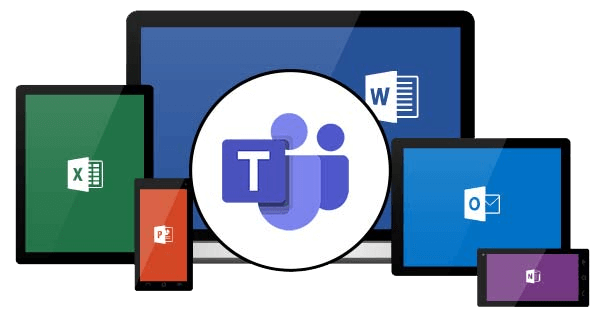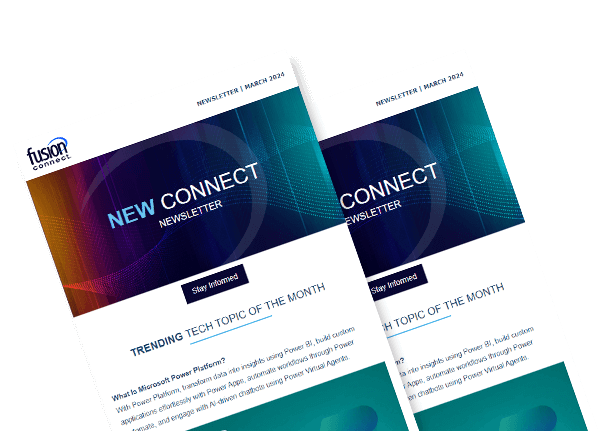What is 5G?
Posted on April 7, 2023 by Fusion Connect
5G is the fifth generation of wireless technology. It has faster internet speeds, less latency, and more bandwidth. It is the next big thing in the world of communications, and it could change how we live, work, and interact with the world around us.

5G Top Features and Benefits
Having reliable connectivity is important, especially when working in a fast-paced work environment. 5G can help to meet your connectivity needs with the following features and benefits:
- Faster Internet Speeds: With speeds up to 20 Gbps, 5G is faster than 4G when it comes to internet speeds.
- Lower Latency: 5G has less latency than 4G, which means that devices can send data to each other more quickly. This makes it perfect for applications that need responses in real time.
- Higher Bandwidth: 5G has a higher bandwidth than 4G, so more devices can connect without slowing down the network. This is important for devices that are connected to the Internet of Things (IoT), which will become even more common in the future.
- Enhanced Network Efficiency: 5G is more efficient than 4G, so it can support more devices and apps at once without draining your devices' batteries.
- Improved User Experience: 5G makes the user experience smoother and more seamless, with faster load times and fewer dropped connections.
Statista says that by 2024, there will be about 1.7 billion 5G connections around the world.
6G, Timelines, and Uses
Researchers are already working on 6G technology, even though 5G is still in its early stages. With speeds of up to 1 terabyte per second, it should be even faster than 5G in terms of speed, latency, and bandwidth. Unfortunately, 6G will not be ready until 2030 as there is still a lot of research to be done.
6G technology is expected to be used for many things, such as virtual and augmented reality, smart cities, and IoT. It is also expected to play a key role in the next generation of industrial automation and the development of self-driving cars.
How to Make Your Internet Go Faster
There are several ways to speed up your internet, such as:
- Upgrading to 5G: If 5G is available where you live, upgrading to a 5G network can make a significant difference in how fast your internet works.
- Using a Mesh Network: A mesh network can help you get faster internet by extending the range of your Wi-Fi signal and giving you better coverage throughout your home.
- Upgrading Your Router: You can also speed up your internet by getting a newer, more powerful router.
- Using Ethernet Cables: When you connect your devices to your router with Ethernet cables instead of Wi-Fi, you can get faster and more stable internet speeds.
- Limiting the Number of Devices Connected to Your Network: If you have too many devices connected to your network, your internet speeds will slow down. Cutting down on the number of devices that are connected will improve performance.
A report from Ookla says that the average download speed for 5G users in the US is 181.23 Mbps. Test your internet speed using Fusion Connect’s Speed Test Plus tool.
Why 5G will be Good for Microsoft Teams and Hybrid Workforces
Microsoft Teams is a powerful collaboration tool that makes it easy for teams to share files, talk to each other, and work together. With 5G, people who use Microsoft Teams can expect faster connections that work more reliably and provide a better overall performance. This will be especially helpful for hybrid workplaces where some employees work from home and need a stable internet connection to talk to their coworkers and collaborate.
5G's better network performance will also make it easier to use Microsoft Teams' features, like video conferencing and screen sharing. This will make it easier for team members to work together, no matter where they are.
5G can also help to reduce latency in real-time communications like video conferencing, making sure that remote workers have a smooth and lag-free experience. This will be especially important for hybrid workplaces, where remote workers need to feel like they are part of the team even though they are not in the same place.
Importance of 5G
In short, 5G technology has a lot of benefits for Microsoft Teams and hybrid workforces, such as faster speeds, lower latency, higher bandwidth, and better network efficiency. These benefits make it easier for people to work together in a way that is more productive and smoother.
Speak to Our Tech Experts
We can help your business optimize your internet connectivity investments. Ask us how!
References:


